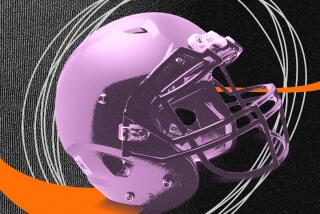Wheeler’s Mother to File Lawsuit
- Share via
Claiming that organizational negligence by Northwestern University contributed to the death of Rashidi Wheeler during football conditioning drills, the player’s mother will file a lawsuit Friday against the university.
In another development Tuesday, the chief medical examiner for Cook County, Ill., questioned a police report indicating that Wheeler had taken two dietary supplements containing the banned stimulant ephedrine before he collapsed and died Aug. 3.
The Rev. Jesse Jackson, serving as spokesman for Wheeler’s mother, Linda Will, said the decision to sue was made during a meeting in Chicago of Jackson, Will and attorney Jim Montgomery, a partner of Johnnie Cochran Jr.
Jackson earlier Tuesday had met with Northwestern President Henry S. Bienen before Bienen held a news conference, at which he asked Will and her family to have confidence in and patience with the university’s investigation into Wheeler’s death.
“Each party has to do what they have to do,” Jackson said. “The university has to minimize its culpability. The NCAA has to enforce its rules. The family has to sue. Each of them has a role.”
Northwestern Coach Randy Walker and Athletic Director Rick Taylor are not expected to be named in the suit, according to Montgomery, but Northwestern trainers and staff who attended the voluntary drill will.
Jackson said the suit will focus on what he called the delay involved from the moment of Wheeler’s collapse during a series of wind sprints until the 22-year-old safety was treated by Evanston (Ill.) paramedics.
Players who witnessed Wheeler’s collapse said trainers delayed calling paramedics because they were uncertain of the severity of the chronic asthmatic’s condition.
Tory Aggeler, Northwestern’s athletic trainer, previously said that Wheeler, from Ontario and La Verne Damien High, had suffered more than 30 asthma attacks in his three years at the university. Montgomery said that history should have ensured that Northwestern’s medical staff would know how to treat Wheeler.
Instead, Montgomery referred to the Evanston police report, which indicated an assistant trainer gave Wheeler a plastic bag to breathe into, as if he were hyperventilating. Montgomery said Wheeler was actually gasping for breath. No oxygen tanks were available at the scene.
“[It was] an incorrect diagnosis and a fatal treatment,” Montgomery said.
As other players collapsed during the demanding drill, a chaotic scene developed, causing trainers to scramble to treat the fallen as Wheeler’s condition deteriorated. When the first attempt was made to reach emergency personnel, a field phone was inoperable, and a cell phone had to be found. More than eight minutes after the first cell phone call, an ambulance arrived.
“The basic case against the school is negligence,” Jackson said. “[Wheeler] was improperly attended to. The issue is not the drill. He’d done the drill before ....
“But when there is such conditioning as this, there needs to be an emergency infrastructure in place.”
Jackson said he had spoken to an NCAA official Tuesday and urged immediate attention to the issues involved in voluntary workouts.
“Conducting a drill like this at a voluntary practice was a risk that exploded,” he said. “It was unauthorized, but supervised and organized. And this practice is widespread among NCAA schools. Practices like this are a gamble, like rolling the dice. In this case, this was a very expensive gamble.
“The NCAA either needs to change its rules on this matter or enforce them.”
Meanwhile, Dr. Edmund Donoghue, the medical examiner, took issue with the police report, saying there was “no evidence,” based on autopsy results, that Wheeler had taken more than one supplement containing ephedrine on the day he died. Donoghue firmly reiterated his office’s findings that an asthma attack caused the player’s death.
“All of the [autopsy] findings could be explained by the use of one supplement,” Donoghue said.
In the police report, Aggeler was quoted as telling two Evanston detectives that Wheeler had taken Ultimate Punch and Xenadrine before the player participated in the wind sprints. Each supplement contains ephedrine, a stimulant banned by the NCAA.
But Donoghue questioned the accuracy of that report, saying: “I don’t think that would be a reasonable conclusion to draw.”
Although Donoghue said it was impossible to detect the exact source of the ephedrine found in Wheeler’s system, he is not convinced the supplements submitted to his office--Ultimate Punch and Xenadrine--were consumed by Wheeler on the day he died.
“There’s no link to the supplements submitted and Rashidi Wheeler,” Donoghue said. “I never heard it asserted that these things belonged to Rashidi Wheeler.”
Donoghue said he believes Wheeler took Ultimate Orange, another supplement containing ma huang , a Chinese herb containing ephedrine.
According to autopsy results, Donoghue said, Wheeler had 110 nanograms per milliliter of ephedrine in his system, or “slightly above the acceptable range for clinical treatment.”
Dr. Neal Benowitz, an ephedra expert and professor of medicine at UC San Francisco, said that level of ephedrine would indicate Wheeler took a “standard dose” from one supplement.
“Exercise is a known trigger for asthma,” Donoghue said. “Here you have a guy who’s an asthmatic put through a tough [workout] program. In the videotape [of the drill], you can see [Wheeler] getting low on oxygen.”
At his news conference, Bienen promised that the school’s investigation into Wheeler’s death would be “comprehensive and thorough,” and refused to estimate when it would be complete.
“I personally believe it’s more important for me and for the community to have confidence in this report than to do it quickly,” he said.
The review is being led by William Banis, vice president for student affairs. He is being joined by Phil Harris of the board of trustees and faculty member Robert Gundlach.
Bienen said 85 interviews have been conducted and noted issues being reviewed include the sequence of events and medical staffing at the drill, emergency procedures, supplement use, how the conditioning program compares to other universities, and possible NCAA violations.
*
Eric Slater in The Times’ Chicago bureau contributed to this report.
More to Read
Go beyond the scoreboard
Get the latest on L.A.'s teams in the daily Sports Report newsletter.
You may occasionally receive promotional content from the Los Angeles Times.











